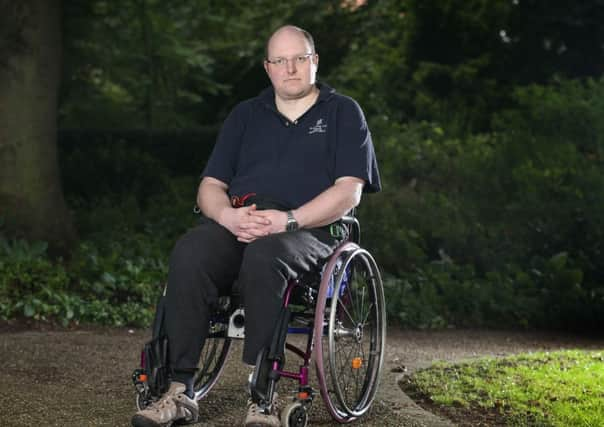Wheelchairs don’t have priority over prams on buses, court rules


The “proper remedy” for wheelchair users to get improvements in such cases is to ask Parliament, three judges ruled.
The judges had been asked to give a ruling following a woman’s refusal to move a pushchair with a sleeping baby from a bay on a bus used by wheelchair passengers.
Advertisement
Hide AdAdvertisement
Hide AdLady Justice Arden, sitting with Lord Justice Lewison and Lord Justice Underhill, unanimously allowed an appeal by First Group, which had been ordered to pay £5,500 damages to wheelchair user Doug Paulley, 36, from Wetherby.
Mr Paulley was denied access to a bus in February 2012 after the woman with the sleeping baby refused to move.
A judge at Leeds County Court ruled First Group was in breach of its duty under the Equality Act 2010 to make reasonable adjustments for disabled people.
Recorder Paul Isaacs declared the company should have taken measures to ensure he was not at a disadvantage when he tried to get on the bus.
Advertisement
Hide AdAdvertisement
Hide AdDisagreeing, Lord Justice Lewison said: “The judge seems to me to have thought that the needs of wheelchair users trumped all other considerations.
“If that is what he meant, I respectfully disagree.”
Lord Justice Underhill said: “It has to be accepted that our conclusion and reasoning in this case means that wheelchair users will occasionally be prevented by other passengers from using the wheelchair space on the bus.
“Sometimes there will be a reasonable justification for that happening, but sometimes there will not.
“I do not, however, believe that the fact that some passengers will - albeit rarely - act selfishly and irresponsibly is a sufficient reason for imposing on bus companies a legal responsibility for a situation which is not of their making and which they are not in a position to prevent.
Advertisement
Hide AdAdvertisement
Hide Ad“In the present state of the law something must still be left to the good sense and conscience of individuals.”
Also allowing the appeal, Lady Justice Arden said: “It follows from the judgments of this court that the proper remedy for wheelchair users is to ask Parliament to strengthen the powers of bus drivers so that they could, for instance, require people to vacate the wheelchair space, or create new duties on other passengers, or to campaign for a different design of buses.
“In that way, a greater number of wheelchair users would be able to use the wheelchair space.”
The judge said she did not underestimate the difficulties of travel for wheelchair users “or their frustration at the pace of change”.
Advertisement
Hide AdAdvertisement
Hide AdThe judge added: “It is obvious that, as one wheelchair user has said, for them the world was not built with a ramp.”
However the only question the court had to answer was whether it would be reasonable for the First Group bus company to have to adopt the policy in favour of wheelchair users proposed by Mr Paulley.
The judge said the answer to that question “in the current circumstances is no”.
Martin Chamberlain QC, for First Group, told the appeal court at a hearing in November that there was a long-running problem on public transport that had produced conflicting court decisions and bus operators were now seeking legal clarity.
Advertisement
Hide AdAdvertisement
Hide AdHe said First Group had appealed because of their need to know “what they are legally required to do and how”.
Mr Chamberlain added: “It will be obvious that (First Group) are much more concerned with the wider effect of Mr Recorder Isaac’s judgment on its policies, customers and staff than on the relatively modest (damages) sum awarded in this case.”
The case also affected “the expectation of disabled people to be able to access public transport”.
The QC said of Mr Paulley’s case: “The problem with the adjustment required by the Recorder in this case is that it requires a rigid policy of priority for wheelchair users over all other passengers, irrespective of their legitimate need to use the same space.”
Advertisement
Hide AdAdvertisement
Hide AdThe requirement “unnecessarily encourages confrontation and is unenforceable”. It was not in the interests of disabled people or passengers more generally, he said.
Mr Paulley’s case was funded in court by the Equality and Human Rights Commission,
Mr Paulley described how on February 24 2012 he tried to board a number 99 bus at Wetherby to Leeds to take a train to visit his parents at Oldham.
He said: “Somebody got there just before me and put a pushchair in the wheelchair space. The bus driver asked her to leave, but she refused so I was not allowed on the bus.
Advertisement
Hide AdAdvertisement
Hide Ad“I ended up missing my train and arriving at my parents an hour late.”
Mr Paulley added: “We are saying it is a reasonable adjustment for a bus company, as a service provider, to insist wheelchair space be made available if needed.”
Mr Paulley said that he might appear to be “a confident guy” coming to court to fight for the rights of the disabled.
But the problems posed by getting access to public transport “impact on my confidence quite a lot”.
Advertisement
Hide AdAdvertisement
Hide AdHe said: “It is a question of not only not knowing whether you are going to be able to get on to a bus but whether there is going to be some conflict.
“Inter-personal conflict is not very pleasant. It is one of the many stresses of getting around in a wheelchair.”